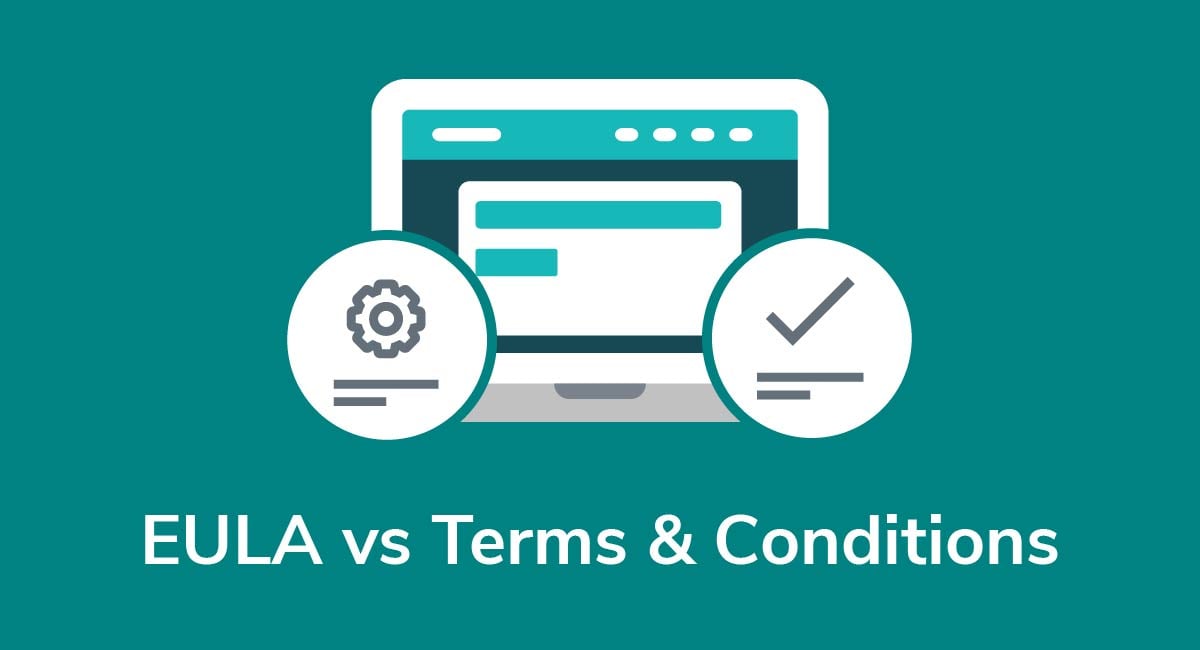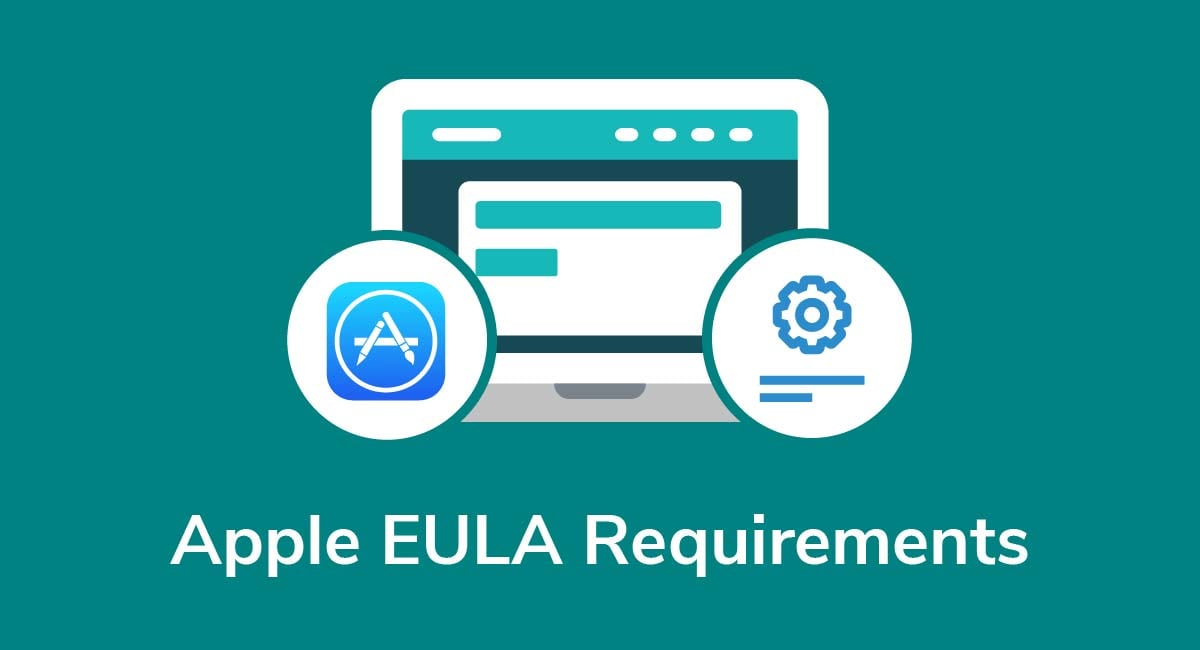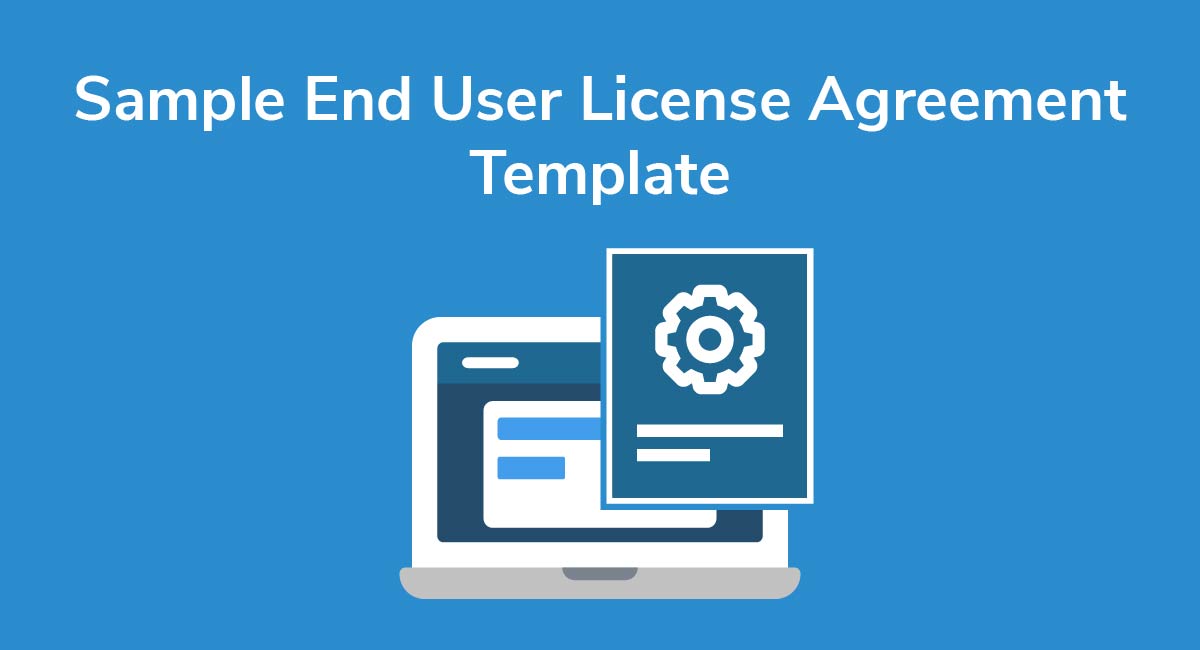Types of Software Licenses
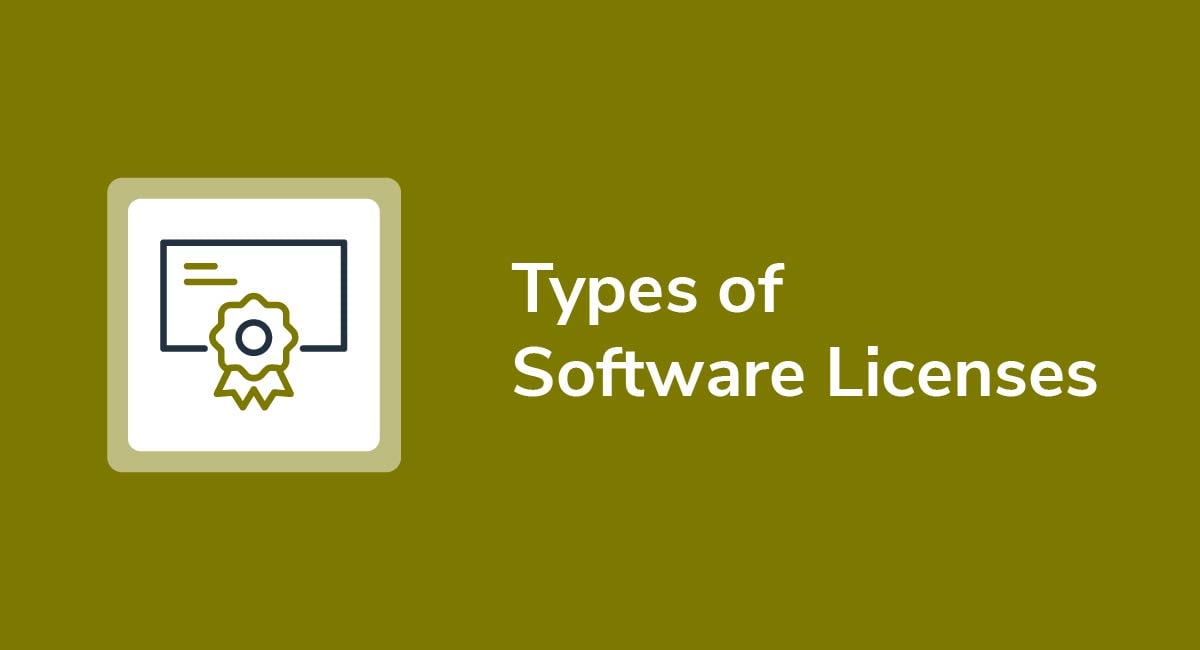
If you're in the software licensing business, it's important to understand the differences between license types and to choose the one that best suits your needs.
In this article, we'll cover software licenses from every angle to help you decide which type makes the most sense for you, your business, and your users.
Get compliant today with PrivacyPolicies.com
Select one of our generators to create the required legal agreements for your business:
- Our Privacy Policy Generator can help you generate a customized Privacy Policy in around three minutes, for free.
- Our Terms & Conditions Generator can help you generate a customized Terms & Conditions agreement in around three minutes, for free.
- Our EULA Generator can create a customized End-User License Agreement for your mobile or desktop app.
- Our Cookies Policy Generator can create a customized Cookies Policy to help your compliance with ePrivacy Directive and GDPR.
- Our Disclaimer Generator can create a disclaimer or disclosure for your website.
- Our Return & Refund Policy Generator can help your ecommerce store by creating a returns or refunds policy.
Integrate a free Cookies Notice and Cookie Consent banner to comply with the EU ePrivacy Directive and the new GDPR law regarding cookies.
- 1. What's a Software License?
- 2. Free Open-Source Software vs Closed Source Software
- 3. Choosing the Best Software License
- 4. What Types of Software Licenses are Available?
- 4.1. GNU License
- 4.2. EULA License
- 4.3. Perpetual License
- 4.4. Subscription License
- 4.5. Metered License
- 4.6. Network License
- 4.7. Trial License
- 5. What Are Some Common Software License Agreement Clauses?
- 5.1. Definitions
- 5.2. License Grants and Conditions
- 5.3. Limitations and Restrictions on Use
- 5.4. Intellectual Property Rights
- 5.5. Modifications to the Software
- 5.6. Limitation of Liability
- 5.7. Disclaimers of Warranties
- 6. Where Should You Display Your Software License Agreement?
- 6.1. Within Your Website Footer
- 6.2. About or Settings Menu on Sites or Within Apps
- 7. Summary
What's a Software License?
A software license is a legally binding agreement between a developer or owner and an end user that grants the user a license to use the software under terms provided by the developer/owner.
Software licenses generally cover things like:
- How the software can and cannot be used
- Whether users can share it
- If the source code can be accessed and modified
- Intellectual property
As a software licensor, a thorough and well-written license will protect you by minimizing your exposure to claims that arise when users use your software. In addition, your license should provide transparency by laying out the ground rules that apply when users use your software.
Free Open-Source Software vs Closed Source Software
With free open-source software (FOSS) or proprietary software, developers generally grant users nearly unlimited rights to use and share the software and to access and edit the source code. In this case, "free" means the freedom to use the software and source code without restriction as opposed to being a reference to cost.
There are some exceptions, but FOSS is often developed by multiple developers working together and made available for non-commercial purposes.
As such, open-source developers may not be motivated by profit. Instead, collaborators may wish to share information and technology that they hope will help other like minded individuals or the general public.
Two examples of FOSS are the office suite LibreOffice and the customizable internet browser Mozilla Firefox. Both LibreOffice and Mozilla Firefox are free and allow users to access and alter source code.
Even so, FOSS generally comes with an EULA because terms and conditions almost always apply.
On the other hand, closed-source software (CSS) licenses generally prohibit users from sharing software and from accessing or altering its source code. This means that only the developer or owner can change the source code.
Examples of CSS include Zoom, Google Docs, and Adobe Reader.
The big differences between the two software types are price, access, and restrictions on use.
Whereas FOSS is generally free, accessible to anyone, and offered with minimal restrictions, CSS is usually only accessible only to paying users and comes with lots of restrictions and limitations.
Choosing the Best Software License

The software license type you choose will depend on:
- What kind of software you develop
- What rights you want to give users
- Whether you want to protect copyrighted material and other intellectual property
Software licenses can be either broad or specific.
A broad license (like an EULA) may be sufficient if you plan on making FOSS available to the general public and allowing users to share it and modify the source code. An EULA is a quick and easy alternative to other licenses, but one big drawback is that they offer very little protection when it comes to copyrighted material.
If you have copyrighted material, a specific license like a perpetual license, a subscription license, or a network license may be a better option.
If you're having trouble deciding which license type makes the most sense for your situation, you may want to ask yourself the following questions:
- Are you offering FOSS or CSS?
- Will your license apply to all users or just one customer or entity?
- Will users have access to the source code, and if so, will they be able to alter it?
- Will users be permitted to share, distribute, display, and sublicense the software or its source code?
What Types of Software Licenses are Available?

In this section we'll look at some of the most common types of software licenses.
GNU License
The General Public License (GPL or GNU) is a popular choice for developers who want to allow users to share, study, and modify their software and its source code.
It's quick and easy to implement because it can be used "as is."
Just remember if you go this route, it's a good idea to read it carefully and make any necessary changes before adopting it as your own.
EULA License
End-User License Agreements, or EULAs, work well for software developers and owners who want to protect their intellectual property and restrict how their software and source code are used.
An example is a developer who doesn't want users to have access to the software's source code because it's a valuable trade secret.
This is often the case with unique software that generates revenue for a company. Since this gives them an edge, they probably don't want their competitors and the general public getting their hands on it.
In your EULA, you can also prohibit end users from reverse engineering your software or source code and from making minor modifications and marketing it as their own product.
Perpetual License
With perpetual licenses, users are permitted to use software indefinitely as long as they adhere to the terms set forth in the agreement.
Perpetual licenses can be used for FOSS and CSS, and since they're open ended, users only have to sign up for a subscription and pay once.
Subscription License
Developers use a subscription license when customers make recurring payments and when they're required to renew their subscription each time the old one expires.
Subscription fees vary depending on the term, which package or features the customer chooses, and whether or not they want to use the software on more than one device.
Metered License
With metered licenses, one or multiple aspects of usage is measured and used to calculate charges.
In most cases, software charges are based on:
- The amount of time the customer uses the software or the server
- Which features they access and use
- How much data they access
Opting for a metered software license may make sense if your users perform sophisticated computations that use lots of server time.
Network License
A network license, or floating license, allows multiple users to simultaneously access programs and apps across a network regardless of where they're located.
This type of license is generally used when software is licensed to users like government agencies and corporations with facilities in multiple states or countries.
Trial License
A trial license grants a user temporary access for a specified amount of time so he or she can see if the software fits their needs before actually buying it.
With so much competition, trial licenses are popular sales tools for customers who want to try out multiple products without obligation before making a final decision.
What Are Some Common Software License Agreement Clauses?

Many software licenses contain the following clauses and provisions because they're applicable to many different software types.
Definitions
Regardless of type, many software licenses begin by defining key terms used in the agreement.
This makes sense because users may not be familiar with the terms or may assume they mean something entirely different than what they really do.
The following example shows the first three terms listed in the definitions section at the top of Mozilla Firefox's public license:
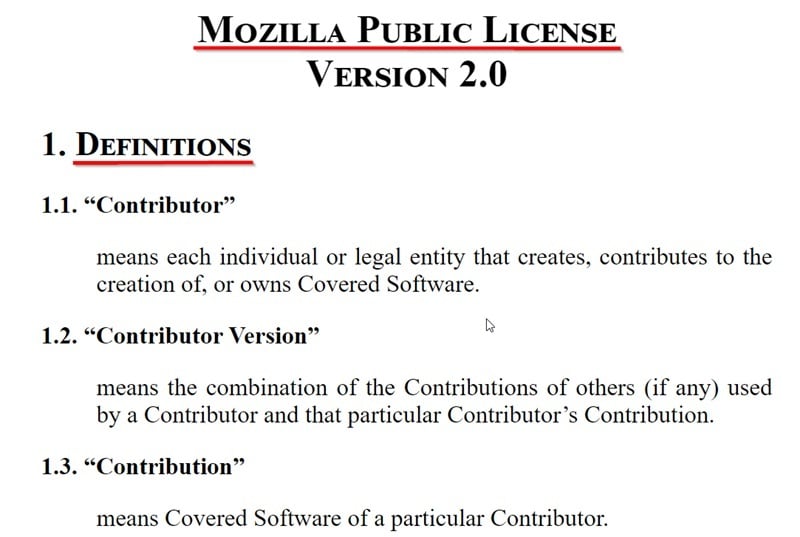
License Grants and Conditions
All software licenses should indicate which uses are granted and what conditions apply.
In this section, you can also touch on things like license terms, sublicensing, fair use, and whether the license is limited to one user or entity.
Below is another example from Mozilla Firefox:
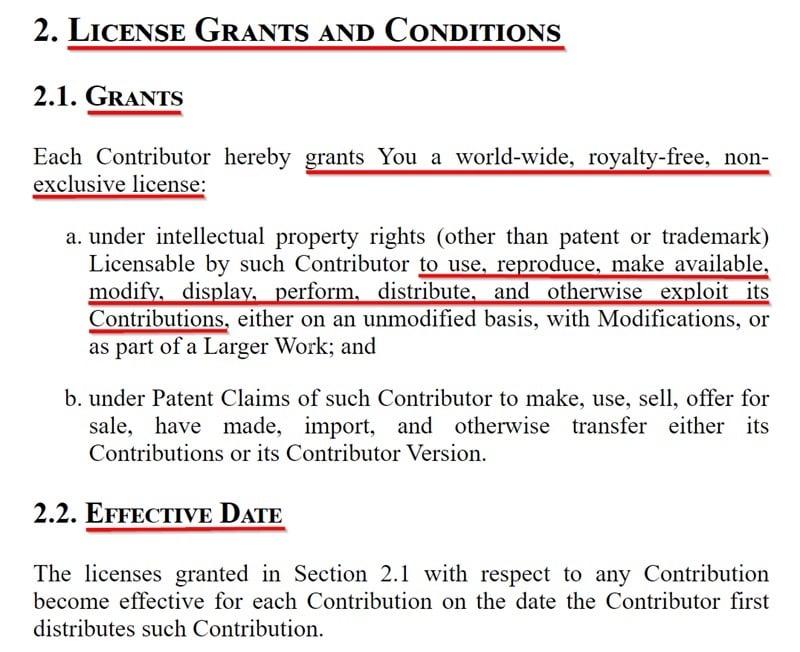
Here, Mozilla Firefox grants users a worldwide, royalty-free, non-exclusive license to use, reproduce, modify, share, and display the software covered in the agreement.
Limitations and Restrictions on Use
Most software licenses include a section that clearly lays out restrictions and limitations on how the license can be used.
For example, some licenses permit personal use but prohibit the software from being used commercially. Another common restriction is prohibiting customers from accessing or altering the source code.
Below is an example of the Restrictions and Requirements section from Adobe's EULA:
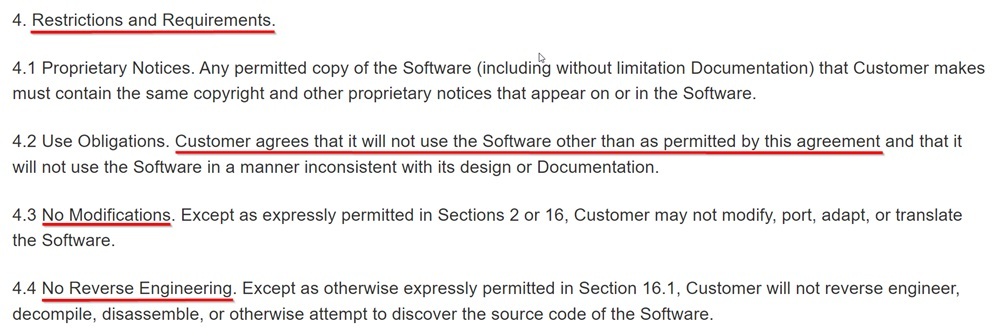
Intellectual Property Rights
Intellectual property can make your business unique and give you a distinct edge over the competition. As such, it's worth protecting your ownership rights when you license software.
For maximum protection, your software license should address intellectual property including the following:
- Patents
- Trademarks
- Trade secrets
- Creative works
Here's how Adobe addresses intellectual property in its EULA:

Adobe's Intellectual Property Ownership clause makes it clear that the software is intellectual property of and owned by Adobe, that the source code is a valuable trade secret, and that the software is protected by law.
Modifications to the Software
While FOSS licenses usually permit modifications to software and source code, this is rarely the case with CSS.
If you're licensing software and are considering allowing users to make modifications, it's important to spell out what is and what isn't permitted in the agreement.
In the following example, Adobe lets users know that the only permitted modifications are the ones found in sections 2 and 16 of its EULA, and that all others are strictly prohibited:

Limitation of Liability
Limitation of liability clauses limit the damages that users can recover from you (the developer or owner) if they experience some real or perceived harm from using your software.
At least in theory, there's no limit on the damages they can claim if your license doesn't include a limitation of liability clause. Your limitation of liability clause can establish limits for damage or simply state that you're not liable for any damages whatsoever.
In the following example, Mozilla Firefox highlights its entire Limitation of Liability clause in bright yellow to emphasize its importance:
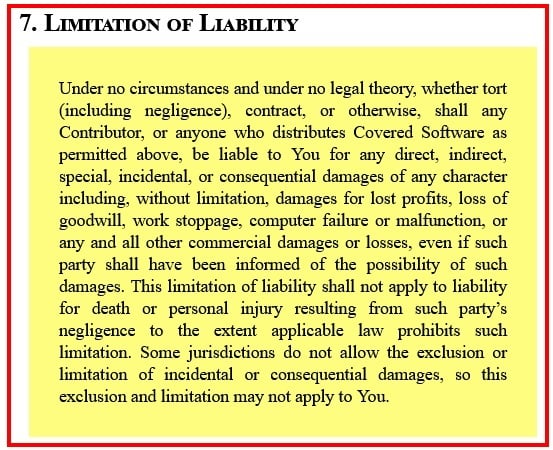
This clause also points out that some jurisdictions (like individual states) don't allow the limitation or exclusion of liability, and that the clause may not apply to users who live in those areas.
Disclaimers of Warranties
Because even the best code and software don't always perform as intended, most software licenses let users know that the product doesn't come with any explicit or implied warranties by including a warranty disclaimer.
Here's an example of this, from Adobe's EULA:
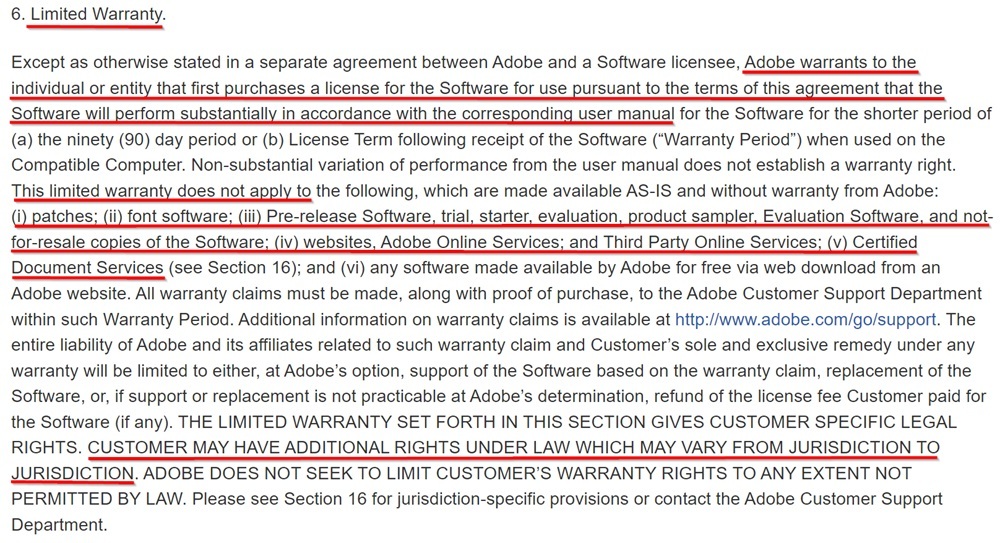
This clause states that the software will perform as expected but that the limited warranty doesn't apply to patches, font software, or trial software.
Where Should You Display Your Software License Agreement?

To ensure that users can find them easily, most software licenses are placed in the following locations.
Within Your Website Footer
It's a common best practice to include a link to your software license agreement in the footer of your website. Users know to look for important documents like legal agreements there, and it will be available from every page of your site.
Here's an example of a website footer with important legal links, including an EULA:
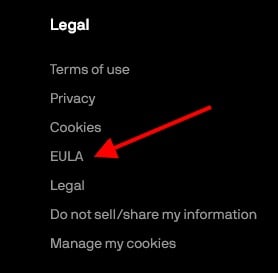
About or Settings Menu on Sites or Within Apps
You can include links to your software license agreement in menu lists, or within in-app menus.
In this example, Inkscape's licensing information can be found by clicking the About icon at the top of the page, then scrolling down and clicking the Licensing heading:
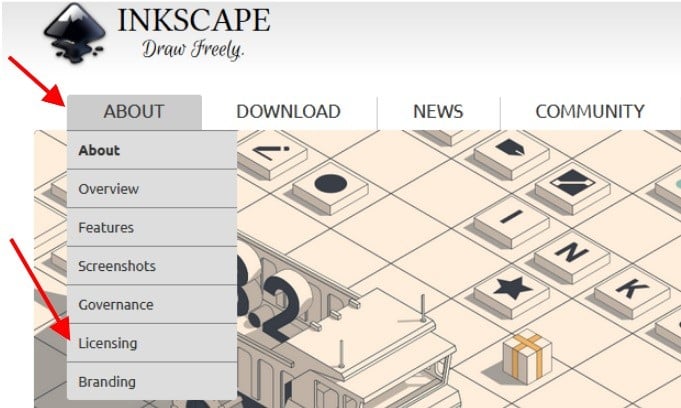
Summary
Software licenses are legally binding agreements between a developer and an end user that spell out how the software and source code can and cannot be used.
With free open-source software (FOSS), users usually have nearly unlimited rights to use and share the software and to access and edit the source code. Closed-source software (CSS) is different, because use is usually restricted and users can't access or alter the source code.
Two main license types include the General Public License (GPL or GNU) and the EULA.
The former is popular with developers who want to allow users to share, study, and modify their software and its source code. On the other hand, an EULA is a better option for developers who want to restrict use while protecting their source code and intellectual property.
Most software licenses include some or all of the following clauses:
- Grants and conditions of use of the license
- Restrictions on use of the license
- Intellectual property
- Modifications
- Limitation of liability
- Warranty disclaimer
Display your software license agreement along with your other important legal agreement links, such as in your website's footer and within site and in-app menus.
